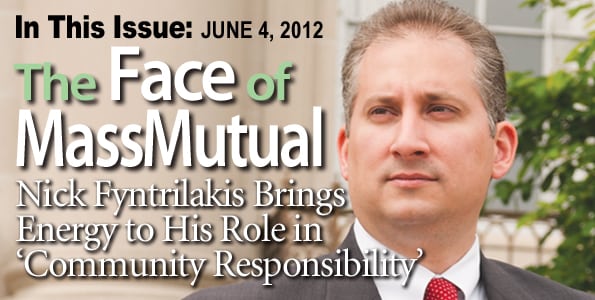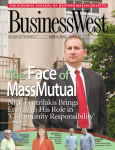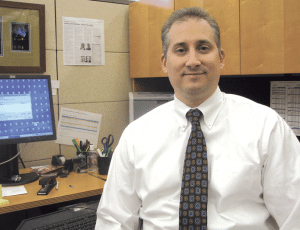
The ‘Face’ of MassMutual
Nick Fyntrilakis Brings Energy to His Role in ‘Community Responsibility’
 Nick Fyntrilakis says that every once in a great while he thinks about what might have happened, career-wise, had he prevailed in that highly controversial race for the 9th Hampden seat in the state House of Representatives in 1999, when he was only 24.
Nick Fyntrilakis says that every once in a great while he thinks about what might have happened, career-wise, had he prevailed in that highly controversial race for the 9th Hampden seat in the state House of Representatives in 1999, when he was only 24.
“My guess is that I’d probably still be in the State House somewhere, or in some role in government,” he conjectured, while contemplating several possible scenarios that could have played themselves out over the ensuing decade — such as a few terms in the House and then maybe a successful run at the state Senate seat vacated by Brian Lees in 2006 — or some other path.
But he didn’t prevail in that race, obviously, losing out in a Democratic primary that wound up being settled in the courts. So he shifted his focus from public service — he had been working as the aide to then-9th District seat holder Dennis Murphy — to an entrepreneurial gambit as a marketing consultant.
This started him down an interesting road to a job that could easily be considered public service — although he’s employed by the massive financial-services giant MassMutual.
Fyntrilakis now holds the title vice president of Community Responsibility, a post that comes complete with a lengthy job description that includes everything from consideration of the thousands of charitable-funding requests the company receives every year, to representing MassMutual on all manner of issues — and at all kinds of events — involving the city of Springfield.
Indeed, while President and CEO Roger Crandall has the helm at the company, Fyntrilakis is in many ways, if not most ways, the face of MassMutual in Springfield and Enfield, what he called the corporation’s “home-office communities.”
Summing up what he does in that capacity, while also simplifying things greatly, Fyntrilakis said he focuses much of his time and energy on what he calls “issues of the day.” These are in a constant state of flux, and vary in terms of how much of his time and energy they absorb. The list includes everything from helping to set the agenda for a recent visit to Springfield by the new chancellor of UMass Amherst, to ongoing work to revitalize the city’s State Street Corridor, to taking a lead role in determining MassMutual’s eventual contribution ($3 million) to Baystate Health’s $296 million Hospital of the Future.
He also chairs DevelopSpringfield, the nonprofit corporation formed in 2008 to advance development and redevelop projects, stimulate economic growth, and expedite the revitalization process within the city.
And then, there’s the tornado that roared through Springfield last June 1. It made his already-packed calendar and lengthy to-do list both exponentially more so. It brought a new category of consideration for the company’s philanthropic endeavors (more on that later) and eventually led MassMutual to designate Fyntrilakis as a loaned executive to help oversee recovery efforts along with Gerald Hayes, a vice president at Westfield State University.
In that role, Fyntrilakis has provided direction for the Rebuild Springfield initiative — a public-private collaboration involving Develop Springfield and the city’s redevelopment authority — which has undertaken development of a master plan that covers all impacted neighborhoods and the city as a whole.
To all of his various initiatives in Springfield, including tornado recovery, Fyntrilakis brings an approach, or philosophy, that he summed up with two words — ‘direct’ and ‘thoughtful’ — and then explained in some detail.
“We have real issues here in the community,” he explained. “If you try to tiptoe around things, that’s not real helpful to anyone; we have to be direct in our communications to each other, understand what the issues are, and get to the point on things.
“At the same time, we need to do things in a thoughtful way and a caring way,” he continued. “I believe that I do both, and I hope that I do both; we need to focus on what the issues are and deal with them in a direct manner, while at the same time, we have to be compassionate and understand the sensitivity of things.”
Both traits are certainly necessary when confronting what he sees as the biggest long-term issue facing Springfield — improving its education system.
“There are no easy answers to the education problem we have in Springfield,” he said. “What I would say is that we need radical change. What I would ask of the mayor and the School Committee as they approach this change of leadership in the superintendent’s office — ‘what is it that we’re going to do that’s significantly different from what we’re doing today in order to get a better result?’”
For this issue, BusinessWest talked at length with Fyntrilakis about his broad role and how he approaches it, and also about Springfield and its prospects for the future.
Learning Curves

Nick Fyntrilakis says he approaches his work on the many issues facing Springfield with the goal of being direct and “thoughtful.”
He would visit many of the stores still doing business there then, including Steiger’s and Johnsen’s Bookstore, and eventually reach his father’s small breakfast-and-lunch restaurant on Main Street called Athens. He worked several different jobs there as he got older, while also devoting significant time to listening to what his father and others were saying about the city and its prospects moving forward.
This curiosity, or fascination, was blended with a sense of community service instilled by his parents — his mother, who worked at the East Springfield branch of the city library, was one of the first members of the East Springfield Neighborhood Assoc., and both parents were involved in a number of political campaigns — and this mix propelled him toward government service.
He started as an aide to Murphy in 1996, not long after graduating from UMass Amherst with a double major (Environmental Science and Resource Economics). About a year and a half later, he decided to seek one of the two open seats on the Springfield School Committee.
“At that time, unlike today, it was very rare to get open seats that were not heavily contested,” he said, adding that there were eventually 13 candidates in the primary for three seats on the ballot. The field was whittled to six, and he ultimately finished third, joining the board when he was only 23.
“I enjoyed it,” he said of his stint on the school board. “It was hard work, but you get a real appreciation of what people are facing in terms of the process and the positives, negatives, and challenges involved with the public schools. There are 40-plus school buildings in the city, and you certainly start to learn about every nook and cranny of the city.”
Fyntrilakis decided to take this knowledge, as well as his love of politics, and seek a much higher office, Murphy’s House seat, in 1999. He eventually lost in the primary to Jack Keough by 32 votes, a number that prompted a complicated recount.
“That election was a real mess,” he recalled. “There were a variety of irregularities, including Republicans voting in a Democratic primary, inactive voters voting and not having their registration confirmed, and dead people voting — there were at least three confirmed dead voters that participated.”
The election was eventually thrown out in Hampden Superior Court, but Keough appealed that ruling. Faced with the appellate court’s desire to bring 150 inactive voters to court to verify their registration, Fyntrilakis dropped the case and returned his focus to the School Committee, to which he won another term in 2001.
Professionally, he started a consulting business, focusing on public relations and marketing. He did that for three years before winning a job at MassMutual. He started in the Hartford office, where he handled oversight of several education programs and outreach involving Hartford residents.
In 2005, he was given the opportunity to lead all educational programs in Springfield and Hartford, among other responsibilities, a career move that required him to step down from the school board. He became an assistant vice president in 2008 and succeeded Ron Copes in the role of director of Community Responsibility, or what had been known previously as Community Relations. He was named a vice president in late April.
When asked if there’s anything approaching a typical day in this job, Fyntrilakis laughed while shaking his head.
There are are a number regular assignments to be handled by him and his staff of nine, such as charitable giving, field programs involving the company’s 5,000 agents, and the LifeBridge free life-insurance program, but then there are those aforementioned issues of the day. He also sits on a number of boards and commissions, from the Springfield Chamber of Commerce to the Springfield Business Improvement District to the United Way.
“Every day is different, and that’s one of the things I like about what I do,” he explained. “We’re involved with a number of different entities, and also involved with improving the community. A lot of the work I do centers around what’s going on that week or what the hot issues are, and things are always changing.”
Twists of Fate
One of the more intriguing components of Fyntrilakis’s job description is overseeing the company’s charitable giving, currently about $7 million per year, and sifting through the more than 1,000 requests, or ‘asks,’ that arrive annually.
Generally speaking, this giving falls into three categories:
• Education, including many initiatives that fall under the corporation’s Career Pathways initiative, which provides scholarships, experiential learning opportunities for young people, and other components designed to track students into careers in financial services and, perhaps, MassMutual;
• ‘Community vitality,’ which includes support to cultural or community activities ranging from the Springfield Symphony Orchestra to July 4th fireworks; from CityStage to the Hoop City Jazz Festival; and
• The broad realm of economic development, which has been a focus area for only the past five or six years, he said. It includes efforts such as State Street Corridor work, downtown revitalization, and the various initiatives carried out by DevelopSpringfield.
The tornado doesn’t fit conveniently into any one category, but in reality, it touches all three, said Fyntrilakis, who noted that Springfield Mayor Domenic Sarno reached out to him just a few days after the tornado struck to take a lead role in the rebuilding effort.
Actually, his involvement in tornado-recovery efforts began within hours after the twister carved its half-mile-wide path of destruction through the city.
“I remember that night being on the phone with [Executive Director] Rick Lee at the Red Cross, saying ‘what do you need? What can we do? — you let us know, and we’re there,’” he told BusinessWest. “The first thing that we did, which was easy, was to cut a check for $100,000 to the Red Cross, and from there we did a lot more with the agency around volunteering and getting our employees involved. We were certainly on the ready to do whatever it was that the city wanted and the Red Cross needed to get the community back on its feet.”
Assessing what’s happened in the year since, Fyntrilakis said the creation of a master plan is an important initial step in the rebuilding process, and the best thing about that document is the level of involvement from city residents.
“One of the top priorities was community engagement, and ensuring that this wasn’t going to be the mayor’s plan or the City Council’s plan, or the consultant’s plan,” he explained. “This was going to be the community’s plan, and at the end of the day, we had that community involvement, exemplified by our last meeting in January, when we had 500 people at St. Anthony’s Social Center to hear the executive summary and ask questions.”
He said the mayor has asked those involved with Rebuild Springfield to use the tornado as a catalyst, not only for restoring damaged areas and encouraging new development, but for city-wide changes in such pressing areas as education, public safety, and job creation — and he believes that the disaster, and the resulting master plan for revitalization, can ultimately become just that, because of that community involvement.
“The best part of this plan, for me, is that it forces, or continues, dialogue among the various parties involved in certain aspects of improving the community,” he said, noting that there will be meetings within the designated tornado-damaged districts to continually gain input from residents and refine specific plans as necessary. “In the past, there wasn’t a formal structure to continue those conversations; people would say, ‘we’ve got our plan, now let’s go off and go about our business.’
“Now, it’s the reverse,” he continued. “We’ve said from the start, ‘we’re going to have a plan; what’s the implementation model, who’s leading it, and how do we drive that?’ There’s a real difference to how the city is approaching this moving forward.”
Work in Progress
When asked about the challenges of working with bureaucracy-laden partners such as City Hall, the School Department, and, in the case of the tornado, state and federal agencies, and also about the enormity of the issues the city is confronting, Fyntrilakis acknowledged that his work can sometimes be trying, but he has the patience and other qualities needed to cope.
“Certainly there are days when it feels like you’re trying to boil the ocean, and you wonder how you’re going to get that done,” he explained. “But those aren’t the majority of the days, because if they were the majority, you wouldn’t be doing this for very long.
“When you step back and look at some of the success — and you really need to concentrate on the success — and have a vision and a belief in what you’re doing and a passion for it, then you can sustain the energy requited to do the work,” he continued. “If you were to put your hands up in the air and say, ‘what am I going to do change things?’ or ‘what is MassMutual going to do to change things?’ on a particular issue, you’re not going to get very far. You have to have that belief and passion in what you’re doing.”
Fyntrilakis said he learned a number of lessons from his predecessor, Copes, about everything from setting priorities for expending time and resources to gaining the all-important momentum needed to achieve progress on pressing issues.
“He was certainly a role model for me, and he was very respected in the community,” Fyntrilakis explained. “He knew when to try to push to get things to move in the right direction, and also when not to.
“He tried to get people rowing in the same direction with a common focus,” he continued. “And that’s what I try to do in my work — to bring people together in this community, and to try to get people focused on what the objective is. I think we all want the same things … a better community, better schools, a more robust economic climate. We want a vital community; the question is, how do we get there?”
As one of the region’s largest employers, MassMutual is looked upon as a resource and potential contributing partner in virtually every endeavor facing Springfield, he said, adding that this simple fact presents one of the company’s biggest challenges — deciding when, where, how, and to what extent to get involved.
“We get invited to every conversation in town, which is great,” he said. “But it’s also somewhat impossible to be involved in every conversation in town, so we try to focus on where there’s the most need, where there are areas we can impact that align with our interests as an organization, and participate in and influence those. But we’re invited to everything.”
Which brings him back to the many problems facing the city’s School Department and the need to bring about that radical change he described.
“It’s a huge issue for the city,” he told BusinessWest. “If people are going to say that we’re chugging along and we’ve got some good things in the hopper, that may be true, but it’s just not happening fast enough to get us to where we need to be. We need significant change.”
The Bottom Line
As he mentioned, Fyntrilakis doesn’t think often about what might have happened if a few more people had voted for him in the House race back in 1999.
He’s very much preoccupied with the present, future, and those innumerable ‘issues of the day’ involving the city he grew up in and remains passionate about.
He’s not in public service in a very technical sense, but those two words probably best sum up everything in his lengthy job description — and concisely describe the philosophy he takes with him to work every day.
George O’Brien can be reached at [email protected]




